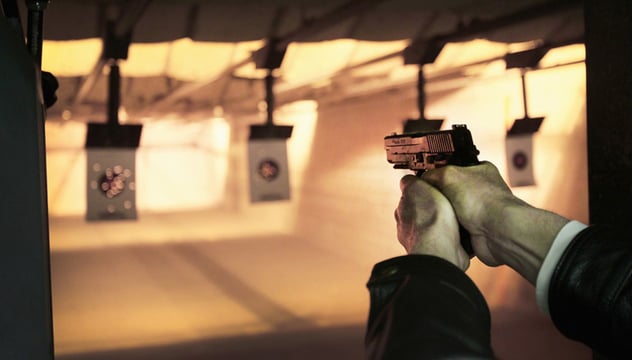By Carrie Lightfoot via TheWellArmedWoman.com
While a guns primary danger lies in the discharge of ammunition, there are other secondary dangers in which a gun may be detrimental to the health of the handler and bystanders. Gun safety rules will also apply to dealing with these secondary dangers of guns.
Danger To Hearing From Noise
When a gun is discharged it emits a very loud noise, typically close to the handler’s ears. This can cause temporary or permanent hearing damage such as tinnitus. Hearing protection such as earplugs (disposable or reusable) or ear muffs (including electronic devices that amplify quiet sounds) should be used to reduce the risk of hearing damage.
Danger Of Hot Gases And Debris To The Eyes
A gun emits hot gases, powder and other debris when discharged which could be harmful. Some firearms, such as semi-automatic and fully automatic firearms typically eject spent cartridge casings at very high speeds. Casings are also dangerously hot when ejected and can fly quite a distance. Revolvers store the spent casings in the chamber, but will be very hot when you eject them. Any of these may hurt the handler or bystanders through burning or impact damage. Because eyes are particularly vulnerable to this type of damage, eye protection should be worn to reduce the risk of injury. Prescription lenses and various tints to suit different light conditions are available.
Dangers From Toxins And Pollutants Such As Lead
Most of us are familiar with the fact that lead is used in making ammunition. Lead is released when a round is fired and residue is found on the spent casings. There can also be exposure when you clean your firearm. There are some basic things you can do to minimize your risk.
- Use lead-free ammunition
- Keep your hands away from your mouth and eyes and avoid eating or smoking when you are practicing, as any residue may be on your hand.
- Don’t handle spent casings.
- Carry lead removal wipes or wash your hands immediately after shooting.
- Wear surgical gloves when cleaning your firearm.
- Check to make sure your indoor range has good ventilation to remove pollutants.
Read Article “Lead and The Shooting Range”
Dangers From Misfires
Though guns and their ammunition are made to exacting specifications and tolerances and designed to function reliably, misfires and malfunctions of firearms and ammunition do happen.
Misfires can be caused by some mechanical issue or be related to the ammunition. There are techniques for dealing with the different types of “misfires” related to ammunition. Mechanical “jams” may require professional attention, if your gun is having any mechanical malfunctions, a qualified gunsmith should look at it and repair it. Shooting with a dysfunctional firearm is not only careless, it puts you and others at risk.
Danger Of Handling a Gun Impaired
Since handling a gun is a complex task with possible fatal outcomes if done improperly, gun safety dictates that a gun should never be handled while under the influence of alcohol or drugs, or legal prescription or over-the-counter drugs. Since such substances may affect a person’s judgment, zero tolerance is advocated by firearm safety teachers. This is codified in many states’ penal codes as a crime of “carrying under the influence”, with penalties similar to DWI/DUI.
Exhaustion can also constitute a form of impairment, as your reaction time, cognitive processing and sensory perception are all impaired by sleep deprivation and/or physical exhaustion. Firearm safety; therefore, discourages using guns when exhausted.








![[BREAKING] Gunman Kills 2, Then Shoots Self At UPS Facility In CA](https://imagedelivery.net/sbm_lYeJbALkepJgtmRD5w/concealednation.org/2017/06/ScreenHunter_856-Jun.-14-14.41.jpg/w=728,h=381)

![[VIDEO] Scientist Shoots Gun At Himself Underwater… Because Science?](https://imagedelivery.net/sbm_lYeJbALkepJgtmRD5w/concealednation.org/2016/01/ScreenHunter_97-Jan.-29-01.12.jpg/w=728,h=381)
![[CCW IN ACTION] Cafe Patron Shoots Armed Robber Dead, Because Concealed Carry Again](https://imagedelivery.net/sbm_lYeJbALkepJgtmRD5w/concealednation.org/2015/10/waterbury-ct-cafe-shooting-ccw.jpg/w=728,h=381)
![[VIDEO] Irresponsible Gun Owner Attaches Pistol To Drone, Because Stupid](https://imagedelivery.net/sbm_lYeJbALkepJgtmRD5w/concealednation.org/2015/07/ScreenHunter_117-Jul.-16-11.07.jpg/w=728,h=381)

